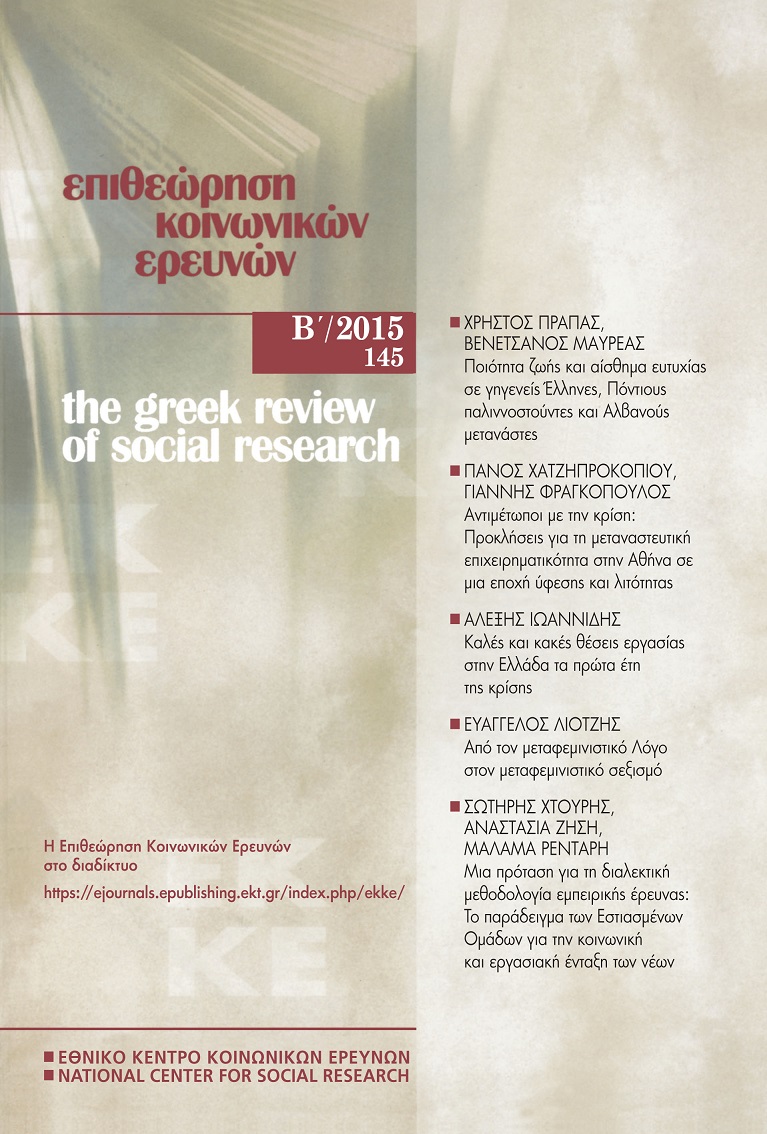Αντιλήψεις και στάσεις της κοινότητας απέναντι στους ψυχικά πάσχοντες και στην ψυχική διαταραχή: Ανασκόπηση εμπειρικών ευρημάτων και μεθοδολογικά ζητήματα
Abstract
Το παρόν άρθρο στοχεύει: α) να ανασκοπήσει τα σημαντικότερα ευρήματα των πρώτων ερευνών που μελέτησαν τις στάσεις τον γενικού πληθυσμού απέναντι στους ψυχικά πάσχοντες και β) να ανασκοπήσει τις μελέτες που διεξήχθησαν την τελευταία δεκαετία σχετικά με τις στάσεις τον γενικού πληθυσμού απέναντι στους ψυχικά πάσχοντες διερευνώντας παράλληλα τα μεθοδολογικά ζητήματα που εμπλέκονται. Τα δύο βασικά ερωτήματα που διατρέχουν την παροικία μελέτη είναι τα ακόλουθα: α) πώς καταγράφονται οι στάσεις του γενικού πληθυσμού απέναντι στους ψυχικά πάσχοντες στη σχετική βιβλιογραφία και αρθρογραφία της τελευταίας δεκαετίας; β) ποιοι παράγοντες (μηχανισμοί, χαρακτηριστικά, μεταβλητές) έχουν βρεθεί να επηρεάζουν τη διαμόρφωση των στάσεων απέναντι στους ψυχικά πάσχοντες;
Article Details
- How to Cite
-
Ζήση Α. (2015). Αντιλήψεις και στάσεις της κοινότητας απέναντι στους ψυχικά πάσχοντες και στην ψυχική διαταραχή: Ανασκόπηση εμπειρικών ευρημάτων και μεθοδολογικά ζητήματα. The Greek Review of Social Research, 103, 131–164. https://doi.org/10.12681/grsr.157
- Issue
- 2000: 103 Γ'
- Section
- Articles

This work is licensed under a Creative Commons Attribution-NonCommercial 4.0 International License.
Authors who publish with this journal agree to the following terms:
- Authors retain copyright and grant the journal right of first publication with the work simultaneously licensed under a Creative Commons Attribution Non-Commercial License that allows others to share the work with an acknowledgement of the work's authorship and initial publication in this journal.
- Authors are able to enter into separate, additional contractual arrangements for the non-exclusive distribution of the journal's published version of the work (e.g. post it to an institutional repository or publish it in a book), with an acknowledgement of its initial publication in this journal.
- Authors are permitted and encouraged to post their work online (preferably in institutional repositories or on their website) prior to and during the submission process, as it can lead to productive exchanges, as well as earlier and greater citation of published work (See The Effect of Open Access).




